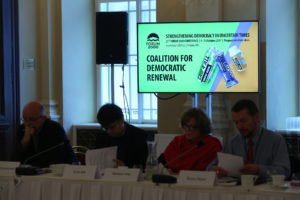 Resilient democratic institutions, such as an independent judiciary and a functioning system of checks and balances within political systems, are critical for the successful control of public-sector corruption, writes Patricia Moreira, Managing Director of Transparency International’s International Secretariat.
Resilient democratic institutions, such as an independent judiciary and a functioning system of checks and balances within political systems, are critical for the successful control of public-sector corruption, writes Patricia Moreira, Managing Director of Transparency International’s International Secretariat.
“If we compare the results of our 2018 Corruption Perceptions Index (CPI) with measures of the quality of democracy, we see that countries with healthier democracies have public sectors that are less corrupt,” she notes. “Looking at the Economist Intelligence Unit’s Democracy Index, for example, we see that not a single ‘full democracy’ scores below the halfway point in the CPI.”
The defense and renewal of democratic institutions is the focus of a bipartisan initiative in one of the world’s leading democracies.
In an email to all federal politicians, Australian Labor senator Kimberley Kitching and Liberal MP Andrew Hastie invited MPs to join a bipartisan group called the “Parliamentary Friends of Democracy” to promote democracy, the rule of law and freedom. It will advocate against foreign interference in Australian institutions and address the declining satisfaction voters have with the democratic system, The Australian reports.
 “Twenty-five years ago, as the Berlin Wall fell and the Soviet Union collapsed, some proclaimed the End of History with the ascendancy of liberal democracy,” the email to MPs said. “Today that optimism appears misplaced, even naive. Democratic institutions are under increasing pressure around the globe from volatile cultural, economic and political forces.”
“Twenty-five years ago, as the Berlin Wall fell and the Soviet Union collapsed, some proclaimed the End of History with the ascendancy of liberal democracy,” the email to MPs said. “Today that optimism appears misplaced, even naive. Democratic institutions are under increasing pressure around the globe from volatile cultural, economic and political forces.”
“We have witnessed the resurgence and rise of authoritarian regimes that use coercive means to pursue their strategic objectives. The rules-based international order is frayed. Many democracies are experiencing internal crises of trust,” it added.
Democracies’ profound crisis of confidence has three fundamental causes, National Endowment for Democracy President Carl Gershman told the 27th Estoril Political Forum:
-

21st Forum 2000 Conference
The first is that democratic leaders and liberal intellectuals have been demoralized and disoriented by the rise of populist and nationalist movements in reaction to the erosion of traditional religious, communal, and cultural norms and institutions. …
- A second cause is the bias against the nation-state by global elites whose thinking dominates global institutions and intellectual debate. According to economist Dani Rodrik, their globalist mindset alienates ordinary citizens and is also analytically mistaken, since the critical economic decisions that affect their well-being are taken at the domestic and not the international level. He calls the nation-state “the foundation of the capitalist order” and worries that the globalist mindset that weakens it will open “political paths for Right-wing populists to hijack patriotism for destructive ends.”
- The third cause of this crisis is the way the rise of social media has affected politics in democratic societies….RTWT







